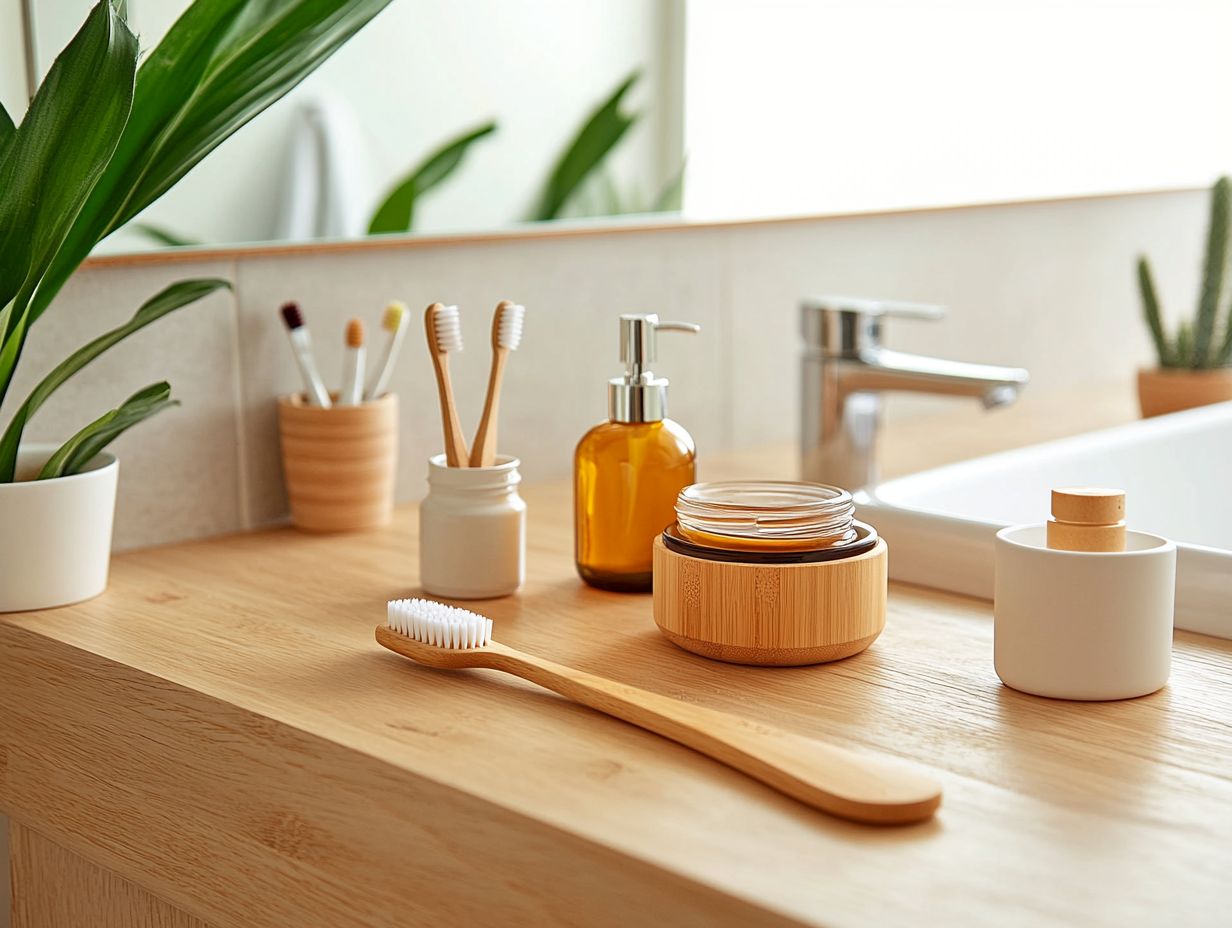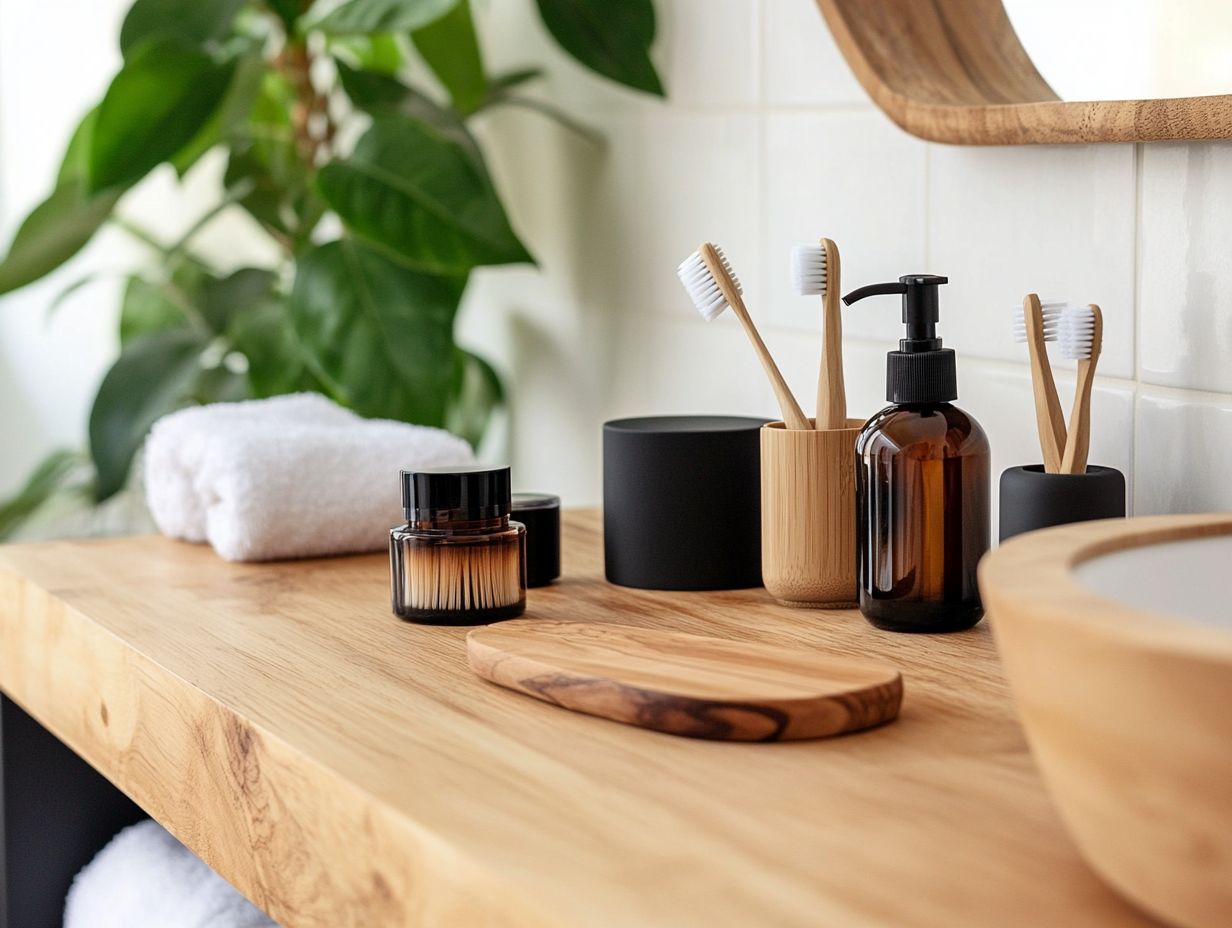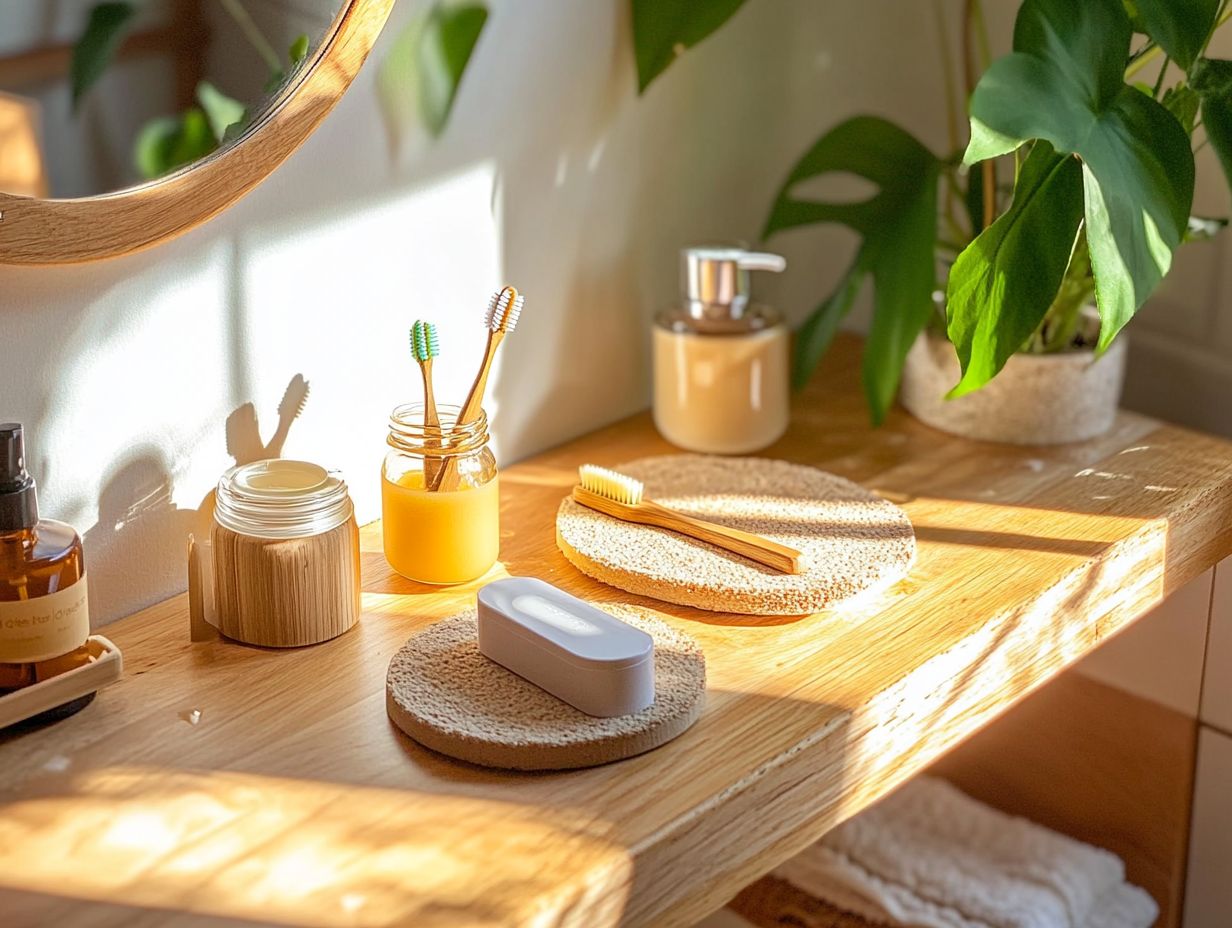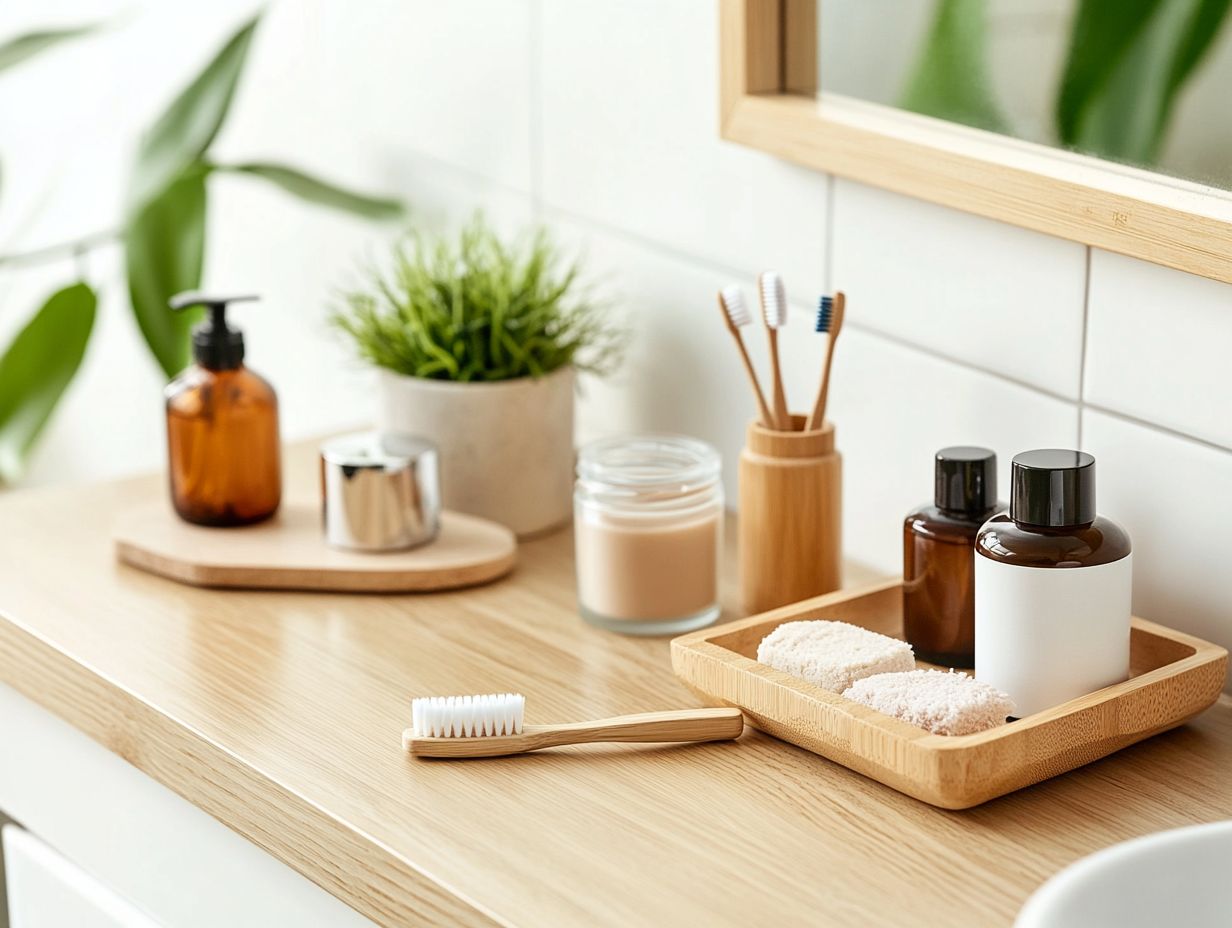In a world increasingly focused on sustainability, zero-waste beauty is emerging as a transformative approach to personal care routines.
This guide covers the essentials of zero-waste beauty, from understanding its principles to crafting a routine that minimizes waste.
Discover the benefits, tackle common challenges, explore natural product options, and learn effective DIY recipes.
Additionally, tips for sustainable packaging and disposal will help maintain a mindset that supports both beauty and the planet.
Join this journey toward a more eco-friendly you!
Key Takeaways:

- Reduce waste by making small changes in your beauty routine, such as using natural and sustainable products and recycling/disposing of them properly.
- Become a zero-waste beauty advocate by understanding the benefits and challenges, and exploring DIY recipes and sustainable packaging options.
- Aim for a zero-waste beauty routine by following a step-by-step guide and adopting sustainable habits and mindset for long-term impact.
Understanding Zero-Waste Beauty
Understanding zero-waste beauty is a crucial step toward establishing a more sustainable and environmentally friendly beauty routine. This approach emphasizes the importance of minimizing waste within the beauty industry through eco-conscious choices, clean beauty products, and sustainable sourcing practices.
As awareness of the environmental impact of traditional beauty products continues to rise, consumers are increasingly seeking alternatives that prioritize both their health and the health of the planet.
By embracing a zero-waste philosophy, individuals can align themselves with brands that focus on minimal packaging, natural ingredients, and cruelty-free cosmetics, while also supporting local businesses.
What is Zero-Waste Beauty?
Zero-waste beauty represents a cosmetic philosophy that seeks to eliminate packaging waste and harmful ingredients commonly found in traditional beauty products. This approach encourages consumers to select items made from biodegradable materials, such as glass or compostable alternatives, thereby minimizing their environmental footprint.
For example, the use of solid shampoo bars instead of conventional bottled shampoos not only reduces plastic waste but also often incorporates natural ingredients that are gentler on the skin. Brands that implement refillable containers or offer incentive programs for the return of used packaging exemplify the principles of this movement.
In this context, clean beauty is particularly significant, as it advocates for formulations devoid of toxic chemicals, which aligns seamlessly with the zero-waste ethos. Furthermore, adopting practices such as DIY skincare and supporting local artisans enhances the commitment to sustainability, transforming beauty routines into a practice of responsible consumption rather than mere aesthetics. For more information, check out this guide on How to Create a Zero-Waste Beauty Routine.
Becoming a Zero-Waste Beauty Advocate

Becoming a zero-waste beauty advocate necessitates the adoption of a mindset that emphasizes sustainable living and the implementation of conscious choices within one’s beauty routine. This advocacy aims to generate a positive environmental impact by encouraging individuals to explore eco-friendly products, reduce waste, and disseminate beauty tips that promote sustainability.
By educating oneself and others about the advantages of zero-waste beauty—such as the use of reusable cloths, refillable containers, and natural ingredients—individuals can contribute to a broader movement toward responsible consumption in the beauty industry. Advocates have the opportunity to inspire change by actively engaging with local businesses that champion sustainable practices and by exploring DIY beauty recipes.
Benefits of a Zero-Waste Beauty Routine
Adopting a zero-waste beauty routine presents numerous advantages, including improved skin health, a reduced environmental impact, and a more ethical approach to personal care.
By utilizing natural ingredients and eco-friendly products, individuals can nourish their skin with gentle, chemical-free alternatives while significantly contributing to waste reduction. The transition to reusable containers, biodegradable packaging, and sustainably sourced materials can greatly decrease the volume of waste sent to landfills.
These mindful choices extend beyond personal care; they foster a culture of sustainability that encourages others to adopt similar practices. This comprehensive approach enables consumers to take pride in their beauty regimen, as they contribute to a healthier planet while achieving radiant and glowing skin.
Challenges and Solutions
Transitioning to a zero-waste beauty routine presents various challenges, notably the widespread use of harmful ingredients and excessive packaging waste within the beauty industry.
Consumers frequently encounter difficulties when navigating the extensive array of product options, as many conventional brands prioritize profit over environmental sustainability. The lack of transparency regarding ingredients and sourcing further complicates the process of making responsible choices.
It is essential to choose brands that prioritize sustainability, as their commitment often results in improved practices and innovative packaging solutions. Education plays a vital role in this endeavor; by understanding the characteristics of genuinely eco-friendly products, individuals can feel enableed to select items that align with their values, ultimately contributing to a more sustainable beauty landscape.
Creating a Zero-Waste Beauty Routine

Establishing a zero-waste beauty routine necessitates a deliberate approach that integrates effective beauty strategies and eco-friendly products, ultimately aiming to reduce waste while enhancing one’s personal care regimen.
This process entails a thorough evaluation of existing beauty products, identifying alternatives with minimal packaging, and incorporating sustainable practices that prioritize natural ingredients.
By making informed choices in product selection—such as opting for refillable containers and embracing DIY recipes—individuals can develop a beauty routine that aligns with their eco-conscious values and supports the zero-waste movement.
Step-by-Step Guide
This step-by-step guide is designed to assist individuals in developing a zero-waste beauty routine that prioritizes sustainability and promotes healthy skin.
By incorporating mindful choices and eco-friendly products into daily practices, individuals can enhance the vitality of their skin while also making a positive contribution to the environment. Adopting zero-waste principles involves selecting items that minimize waste, such as opting for reusable cloths instead of single-use wipes, and choosing gentle cleansers that are packaged sustainably.
Furthermore, utilizing natural exfoliants can ensure that one’s beauty routine aligns with eco-conscious values. As individuals explore these options, they will discover how to achieve radiant skin while making a lasting impact on the planet.
Zero-Waste Beauty Products
Zero-waste beauty products are meticulously crafted to minimize environmental impact while ensuring effective results through the use of natural ingredients and sustainable packaging. These products frequently incorporate refillable containers, compostable materials, and ethically sourced components to foster a more environmentally conscious beauty routine.
As the demand for eco-friendly cosmetics continues to rise, brands such as Elate Cosmetics and Kjaer Weis are at the forefront, delivering innovative solutions that prioritize both performance and adherence to zero-waste principles.
Exploring Natural and Sustainable Options

Exploring natural and sustainable options in beauty can lead to healthier skin and a reduced environmental impact, primarily through the use of eco-friendly products and organic ingredients.
By choosing cruelty-free cosmetics, individuals not only establish a healthier routine but also contribute to ethical beauty practices that prioritize the well-being of animals and the planet. For example, selecting brands that utilize plant-based formulas—such as organic jojoba oil or shea butter—can nourish the skin without the inclusion of harmful synthetic chemicals.
Products like biodegradable face masks and zero-waste moisturizers exemplify how effective beauty solutions can align with sustainable living. Incorporating these practices not only enhances personal beauty but also fosters a collective responsibility towards the environment, encouraging a shift within the industry as more consumers seek to adopt a cleaner, greener approach to skincare.
DIY Beauty Recipes
Creating DIY beauty recipes presents an exceptional opportunity to adopt a zero-waste lifestyle while utilizing natural ingredients specifically suited to one’s skin requirements.
By opting for homemade masks and skincare products, individuals can significantly reduce excess packaging while incorporating ingredients that are both beneficial for their skin and environmentally friendly. These recipes provide the advantage of customization based on personal preferences, fostering a more mindful approach to beauty. For example, by using simple ingredients such as honey, avocado, or oats, one can formulate nourishing face masks and scrubs that naturally exfoliate and hydrate the skin.
This shift towards sustainable beauty practices not only contributes to environmental preservation but also provides reassurance that the products applied to the skin are free from harmful chemicals and additives. Such practices are in harmony with the increasing movement towards a holistic and eco-friendly lifestyle.
Sustainable Packaging and Disposal
Sustainable packaging and disposal practices are essential for achieving a zero-waste beauty routine, as they directly tackle the issue of packaging waste that is prevalent in the industry.
Tips for Proper Disposal and Recycling
Implementing appropriate disposal and recycling practices is essential for maintaining a zero-waste beauty routine and minimizing environmental impact.
By adopting these strategies, individuals can make a significant contribution to reducing the waste generated by beauty products. Understanding local waste management policies is critical, as these regulations often dictate which materials are eligible for recycling or composting.
For example, many municipalities provide specialized programs for recycling challenging items such as plastic containers or glass jars commonly used for cosmetics. Additionally, exploring options like returning empty packaging to retailers or utilizing refill stations for products can further enhance sustainability efforts.
Ultimately, informed choices not only support a greener planet but also foster a shift toward more responsible consumer behavior within the beauty industry.
Maintaining a Zero-Waste Beauty Routine
Maintaining a zero-waste beauty routine necessitates consistent effort and the implementation of sustainable habits that prioritize eco-friendly products and practices.
Sustainable Habits and Mindset
Embracing sustainable practices and adopting a zero-waste mindset is essential for those aiming to create a meaningful impact on their beauty routines and the environment.
By incorporating eco-friendly choices, such as selecting products in recyclable packaging and supporting brands that prioritize cruelty-free practices, individuals can make significant contributions to a healthier planet. Simple actions, such as opting for refillable containers or creating homemade skincare remedies, not only reduce waste but also enhance one’s connection to their beauty regimen. This intentional approach minimizes the carbon footprint associated with mass-produced goods and fosters a shift towards more mindful consumption.
As awareness of personal choices increases, the resulting ripple effect promotes a broader movement towards sustainability within the beauty industry, emphasizing the collective power of informed consumers.


